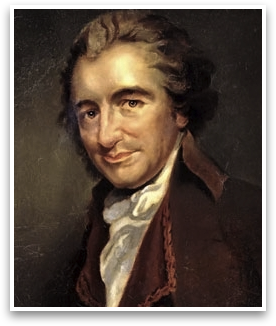
Thomas Paine
Although not often remembered as a founding father, the journalist, rhetorician, and master pamphleteer Thomas Paine may indeed lay claim to inciting the American Revolution through the widely-read pamphlet Common Sense.
Less successful (due likely to its incendiary subject matter) was his treatise on organized religion entitled The Age of Reason, which caused the once-beloved writer to be ostracized in his later years.

Themes and Facts
- The son of a Quaker father and an Anglican mother, Paine embraced the tenets of Deism like other contemporaries such as Franklin and Jefferson.
- Like Benjamin Franklin, he was primarily self-taught.
- Worked as a journalist but made his mark as a pamphleteer.
- Made his mark with the pamphlet Common Sense, which sold hundreds of thousands of copies.
- Discussed his religious and philosophical beliefs in The Age of Reason.
- As a writer, he is celebrated for his clear style and masterful rhetoric.
Study Questions
- What was the impetus for Paine to write Common Sense? To whom is it addressed?
- What arguments does Paine offer as support for independence? What are the "principles of nature and common sense" that he mentions? Do you see any logical shortcomings in his work?
- What is Paine's view of government and how does that make his case for independence even more convincing?
- Why does he think that revolution is inevitable?
Despite his later loss of reputation and ignominious end (he had alienated many friends, including president George Washington), Thomas Paine was nevertheless the voice of a generation ripe for independence and revolution.